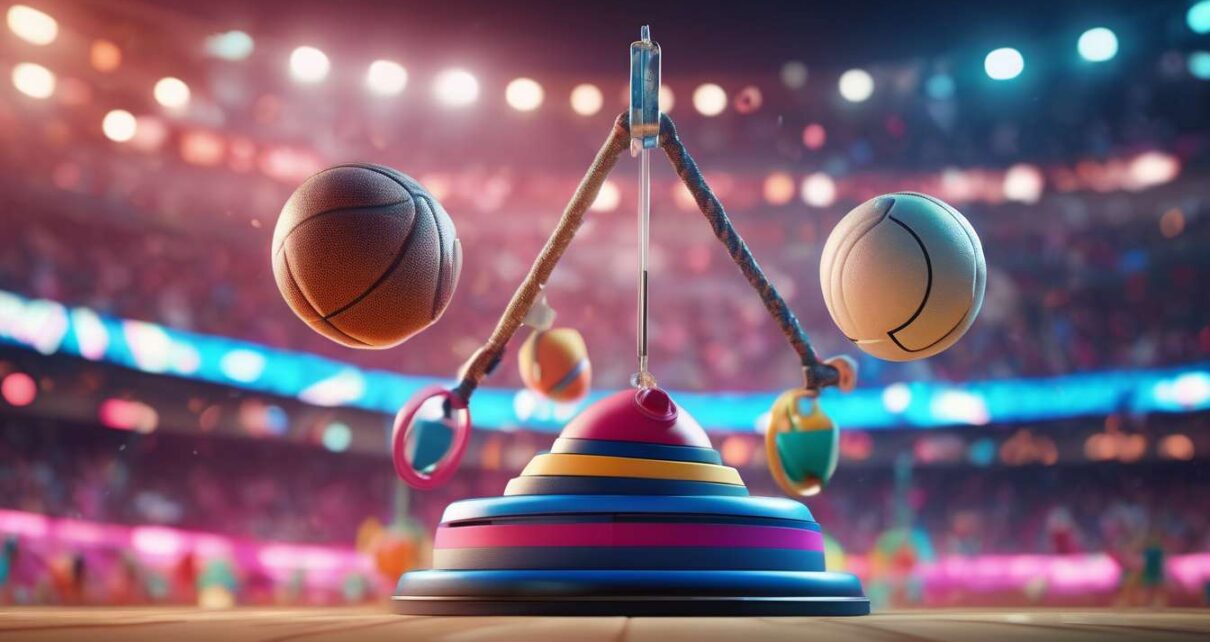As avid sports enthusiasts, we pride ourselves on our ability to predict the outcomes of games and tournaments. However, despite our enthusiasm and expertise, we often fall prey to various biases that skew our predictions. These biases, whether we acknowledge them or not, shape our perceptions and influence our decisions.
In this article, we aim to uncover the seven most common biases that can distort our sports predictions. By understanding these biases, we can hone our predictive skills and approach our forecasts with a more critical and informed mindset.
Together, we will explore how factors such as:
- Overconfidence Bias: Overestimating our knowledge or abilities in predicting outcomes.
- Recency Effect: Giving undue weight to recent events over historical data.
- Confirmation Bias: Seeking information that confirms our preexisting beliefs and ignoring contrary evidence.
These biases subtly infiltrate our assessments, often leading us astray.
We believe that by recognizing and mitigating these biases, we can improve our ability to make more accurate and reliable predictions, ultimately enriching our sports-watching experience.
Let’s delve into these biases and learn how to counteract their influence.
Overconfidence Bias in Sports Predictions
Overconfidence Bias in Sports Predictions
Many of us fall prey to overconfidence bias when predicting sports outcomes, often overestimating our ability to foresee the results. We gather with friends, debating fiercely about which team will win, convinced that our predictions are spot-on. In these moments, we bond over shared beliefs and the excitement of the game. However, our overconfidence can lead us astray, as we often ignore the complexity and unpredictability inherent in sports, making our predictions more of a gamble than a scientific forecast.
Influence of Community Dynamics
When we’re part of a community that shares our enthusiasm for sports, it’s easy to fall into a pattern of overconfidence. We:
- Echo each other’s sentiments
- Reinforce our biased views
- Believe in our collective foresight
As a group, we might dismiss the influence of:
- Injuries
- Weather
- A player’s off-day
All of these factors can skew outcomes.
Acknowledging Bias for Better Discussions
By acknowledging our bias, we can foster more thoughtful discussions. This allows us to enjoy the camaraderie without the pressure of always being right.
Recency Effect and its Influence
Our tendency to emphasize recent performances can skew our judgment, leading us to overvalue short-term success when predicting sports outcomes. This bias, known as the recency effect, can make us forget the broader picture.
As sports enthusiasts, we want to feel connected to the excitement of the latest matches, the thrill of a last-minute victory, or a standout performance. However, getting swept away by recent events can cloud our predictions, causing us to overlook consistent performers or longstanding trends.
In our collective experience, we’ve seen how this bias influences predictions:
- An athlete’s impressive performance in the latest game might lead us to overestimate their future success.
- We might favor a team that’s on a winning streak, ignoring their overall track record.
By focusing too much on the latest outcomes, we risk making predictions that don’t fully reflect a team or player’s true capabilities.
Let’s strive to balance recent feats with historical context, ensuring our sports predictions are fair and informed.
The Impact of Confirmation Bias
Our tendency to seek information that confirms our pre-existing beliefs often skews our sports predictions, leading us to overlook contradictory evidence.
When we’re convinced that our favorite team will win, we instinctively highlight statistics and expert opinions that align with our hopes. We dive into discussions with fellow fans, creating an echo chamber where dissenting views rarely surface. This bias makes us feel connected, but it also clouds our judgment.
In the realm of sports predictions, confirmation bias can cause us to ignore key factors such as:
- Player injuries
- Recent performance declines
We might dismiss an underdog’s potential because it contradicts our established narrative. This behavior isn’t just about being right; it’s about belonging to a community that shares our beliefs.
By recognizing this bias, we can strive for more balanced predictions.
Let’s embrace diverse perspectives and challenge ourselves to consider the full picture, fostering a deeper sense of connection within our sports-loving community.
Anchoring Bias in Sports Forecasting
Anchoring Bias in Sports Forecasts
When making sports forecasts, we often latch onto an initial piece of information, such as a team’s early-season performance. This tendency, known as anchoring bias, skews our judgment throughout the rest of the season.
- We might see a team start strong and assume they’ll maintain that level.
- Even when new data suggests otherwise, we overvalue the initial impression, making it hard to adjust our expectations.
Community Influence
In sports, the need to belong in a community of fans can amplify this bias.
- We share early-season predictions with friends and fellow fans.
- This reinforces our original stance and becomes a badge of loyalty.
- As a result, it becomes tougher to reconsider our predictions as the season unfolds.
Overcoming Anchoring Bias
By recognizing anchoring bias, we can strive to be more flexible and open-minded with our forecasts.
- Challenge ourselves to adapt and refine predictions as new information becomes available.
- Ensure accuracy and fair assessments by not clinging to initial impressions.
- Encourage dialogue that embraces changing opinions based on updated data.
By doing so, we improve the accuracy of our sports forecasts and foster a healthier community of sports enthusiasts.
Availability Heuristic in Predictions
We often rely on the availability heuristic, where the ease with which we recall past events influences our sports predictions. This bias can lead us to overestimate the likelihood of outcomes based on recent or memorable games. For instance, if a team recently pulled off an unexpected win, we might predict their future success more confidently, forgetting their overall performance.
As a community of sports enthusiasts, we share stories of last-minute goals or stunning comebacks, solidifying these memories as benchmarks for our predictions. We might overlook statistical data in favor of these vivid events, leading to skewed expectations. This bias creates a sense of camaraderie as we collectively recall iconic moments, but it also challenges our objectivity.
By acknowledging this bias, we can work together to make more balanced sports predictions.
Let’s strive to blend memorable moments with comprehensive analysis, ensuring our predictions are not just based on what’s easy to recall, but on a thorough understanding of the game.
Steps to Achieve Balanced Predictions:
-
Acknowledge the Bias: Recognize when the availability heuristic is influencing your predictions.
-
Incorporate Data: Use statistical data to complement memorable events.
-
Encourage Discussion: Engage with other enthusiasts to gain diverse perspectives.
-
Reflect on Predictions: Regularly review past predictions to understand biases and improve future accuracy.
By following these steps, we can ensure that our sports predictions are both enjoyable and well-informed.
Hindsight Bias in Sports Analysis
We often fall into the trap of hindsight bias, where outcomes appear inevitable after the fact, skewing our analysis of games and decisions. We’ve all experienced that moment during a sports broadcast or post-game discussion when someone confidently declares, "I knew that would happen." It’s a familiar feeling, isn’t it?
Hindsight bias can make us feel like we’re part of an exclusive club of insiders who saw it coming all along. However, in reality, it clouds our judgment and affects our future predictions.
In the world of sports, this bias can lead us to overestimate our ability to predict outcomes. We might think:
- Our team’s victory was obvious.
- A coach’s strategy was bound to fail.
Such thinking can create a false sense of security, leading us to ignore valuable insights and repeat the same analytical mistakes.
Let’s strive to be more aware, acknowledging that not all sports outcomes are as predictable as they seem in hindsight.
Groupthink’s Role in Predicting Outcomes
In our quest to predict sports outcomes, we often fall prey to groupthink, where the desire for consensus overrides individual critical thinking. This bias can lead us to join the majority opinion, even if it’s not the best choice. We tend to trust the crowd, believing that there’s safety in numbers, but this can cloud our ability to make accurate predictions. By sticking to the group, we might miss out on valuable insights from diverse perspectives.
In sports, when analysts or fans rally around a popular opinion, we risk overlooking critical data or alternative viewpoints. This collective mindset can skew our predictions, making us more vulnerable to errors. Our love for camaraderie and belonging within the sports community can sometimes blind us to objective analysis.
To combat this tendency, let’s challenge ourselves to:
- Step back and question the consensus.
- Value independent thinking.
- Consider diverse opinions.
By doing so, we can enhance the accuracy of our sports predictions and foster a more inclusive environment.
The Influence of Optimism Bias on Forecasts
We often let our hopes and positive expectations cloud our judgment, leading to overly optimistic forecasts in sports outcomes. As fans, we want our teams to win, and this optimism bias skews our predictions.
We’re drawn to the idea that our favorite team will clinch the championship, ignoring stats and trends that suggest otherwise. This bias isn’t just about blind loyalty; it’s about the shared experiences and camaraderie we feel as part of a sports community.
When we make predictions, we’re confident our team’s potential will shine through, despite evidence pointing to a tougher reality. Optimism bias can lead us to overlook:
- Injuries
- Tough opponents
- Poor form
In our sports circles, it feels good to share these hopeful forecasts, even if they aren’t realistic.
By acknowledging this bias, we can strive for more balanced and accurate predictions. This ultimately enhances our connection with the sports community through shared understanding and realistic expectations.
How do technological advancements affect the accuracy of sports predictions?
Technological advancements greatly enhance the accuracy of sports predictions.
With advanced analytics and real-time data tracking, we can make more informed decisions. These tools allow us to:
- Analyze trends
- Assess player performance
- Evaluate other crucial factors swiftly and accurately
By leveraging technology, we gain a competitive edge in predicting outcomes and adjusting strategies accordingly.
Embracing these advancements empowers us to improve our predictive abilities and stay ahead in the ever-evolving world of sports forecasting.
What role does statistical analysis play in improving sports forecasting?
Statistical analysis plays a crucial role in enhancing sports forecasting accuracy.
By examining past data and trends, we can identify patterns and make informed predictions about future outcomes. These analyses help us understand:
- Player performance
- Team dynamics
- Various influencing factors
Utilizing statistical tools allows us to make more educated decisions when predicting sports outcomes.
It’s a key component in improving the reliability and precision of our forecasts.
How can one differentiate between a lucky prediction and a well-informed one?
To differentiate between a lucky prediction and a well-informed one, we focus on consistency and research.
Key Differences:
-
Luck:
- Can come and go
- Relies on chance without a solid foundation
-
Well-Informed Prediction:
- Based on data, analysis, and understanding of the sport
- Consistently applies principles and considers various factors
- Involves effort and informed decision-making
By consistently applying these principles, we increase our chances of making accurate predictions. It’s about putting in the effort and making informed decisions rather than just relying on chance.
Conclusion
In conclusion, when making sports predictions, it’s crucial to be aware of the common biases that can impact your forecasts. Overconfidence, recency effect, confirmation bias, anchoring, availability heuristic, hindsight bias, groupthink, and optimism bias all play a role in skewing predictions.
By recognizing and actively combating these biases, you can improve the accuracy of your sports forecasting and make more informed decisions in the future.
Stay vigilant and stay sharp in your predictions!




